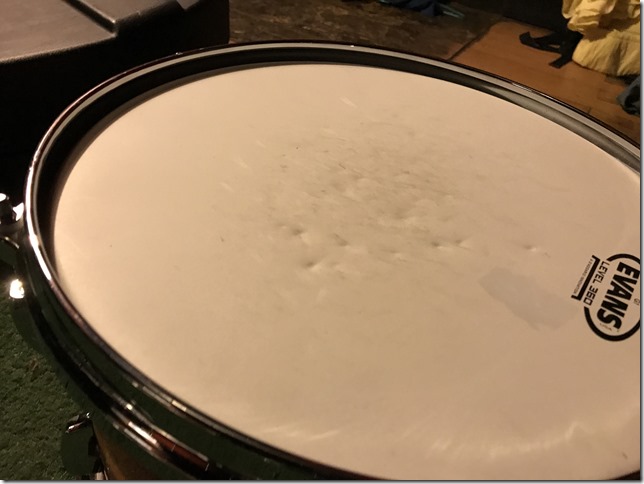Last week I played a gig with a three-band bill on a small stage, so the conditions were ripe for the “backline sharing” suggestion. You may know my stance on backline sharing, but just to refresh: I absolutely hate it and avoid it at all costs. At the same time drummer get put into situations where you’ll look like a pretty big jerk if you don’t backline share. This typically comes when you don’t have a good staging area for gear, a tight stage, and finally a tight schedule that doesn’t allot much time for transition. Even with this all being the case, I wasn’t planning on backline sharing when a last-minute mix-up forced the issue.
What makes backline sharing awful are all of the unknowns associated with it. You don’t know what kind of setup each drummer has, what gear they’re planning on supplying on their own, the differences in quality and tone between kits, as well as how they set up and position all of the equipment. After setting up and tearing down my kit countless times, I’ve come to master the position of every element in my drum set. This is in large part enabled by having memory locks and various heights/lengths pre-set from your usage. All of that goes out the window when you backline share. Rather than focus on moving your kit on and off the stage, you’re stuck having to re-adjust everything that was there before, which is not often corrected until a few songs into your performance.
This leads me into how to suck at backline sharing:
Don’t over-adjust someone else’s kit just because you have some crazy posture. Look, I know we’re all not the same height and build. I know we all approach things differently, but do you seriously need to raise my throne 8 inches (as well as all of the subsequent drums and cymbals) to enable your technique? You’re not eight inches taller than me. If you know your approach is that different and will need to adjust every piece of equipment: don’t backline share.
I liken playing someone else’s drum set to driving someone else’s car: while you’re not familiar with all of the intricacies of the car, every car roughly drives the same and thus you should be able to get from point A to B without much resistance. You’re not going to win any races driving someone else’s car for the first time, but at that point, you need to adjust your expectations. This is the same with drum sets: you might not be able to do any crazy-ass solo on someone else’s kit, but for the most part you should be able to hold the pocket and drive a short set on without heavy drum adjustment.
Don’t treat the drumset owner like your drum tech. Granted, there are parts in drum setup and teardown where you want to be personally responsible (basically any point that something could break, or you’ve got a mental checklist that ensures you’re not forgetting anything), but if the drummer has cases then the least you should do is help load in and load out. I didn’t let you play my drum set just so that you can have a night off from schlepping gear.
But most importantly…
Treat their gear with respect!
I mean come on.
Look, I know drum heads are meant to wear out and be changed. I know that they’re relatively not expensive (although $12-15 per head still isn’t chump change). I know there are drummers go through heads in 1-2 weeks – but that’s not me, AND IT’S MY DRUM SET. Others may disagree with me, but over 25 years of drumming has taught me that you can get a great, loud sound out of your drums without pounding the shit out of it. If you are that drummer, then how the hell do you not notice this after playing on someone else’s kit?? If there was an apology and an offer to help replace the head, I probably would have even let this slide, but now you’ve left me in an uncomfortable position of being a collection agent.
Moral of the story: don’t backline share, but if you do, don’t be a jerk about it.
